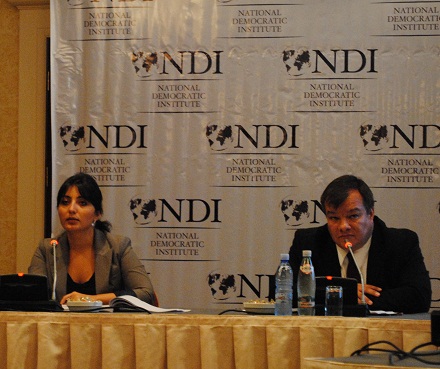TBILISI, DFWatch – 63 percent of Georgians approve of the appointment of the former interior minister as prime minister; 47 percent think the upcoming election will be more or less well-conducted, while 62 percent will not support the opposition if it decides to begin street rallies after the election. These are some of the results of a new survey by the National Democratic Institute (NDI).
The poll was carried out in August, and shows that 63 percent of those questioned approve the appointment of Vano Merabishvili as prime minister; an unexpected decision by President Mikheil Saakashvili which necessitated a vote of confidence by parliament and the appointment of new ministers and deputies. 16 percent disapprove the decision, 18 percent don’t know, while the rest refuse to answer.
52 percent think the office of prime minister will become stronger after Vano Merabishvili’s appointment, 2 percent think it will become weaker, while 15 percent think it won’t change. 29 percent say they don’t know.
People were also questioned about the actions by the State Audit Office, including the fining of opposition billionaire Bidzina Ivanishvili. 41 percent of those questioned who were familiar with the case disapprove of this action, while 16 percent agree with it, and 39 percent don’t know.
44 percent disapprove of the seizing of satellite dishes belonging to Maestro TV based on allegations of vote buying by Bidzina Ivanishvili’s Georgian Dream coalition, 14 percent approve of it, while 36 percent don’t know.
62 percent won’t participate in street rallies if the opposition coalition leader calls for it in case of election fraud, 16 percent will.
47 percent of those questioned think the upcoming parliamentary election will be conducted somewhat well, 13 percent think it will be conducted in a fully satisfying way, 18 percent think it will be somewhat falsified, 3 percent think totally falsified, while 18 percent don’t know.
Parliament recently approved new regulations of must-carry and must-offer which obliges cable operator networks to carry the signal of all broadcasters, while broadcasters are not allowed to switch off their signals for a 60 day period before an election. 46 percent approves of this decision, 44 percent don’t know, and 6 disapprove.
Local non-governmental organizations (NGOs) and some opposition representatives still try to assure the government to expand the terms of implementation of these principles and make part of the media legislation. 47 percent would support extending the must-carry obligations through election day and beyond, 6 percent would not support it, 44 percent don’t know.
54 percent receive their TV signal via antennas, 27 percent through satellite dishes, 23 percent through cable. 88 percent say TV is their main source of information.
There are 14 percent among questions who say they personally know someone who in their view was fired from a state job because of their political beliefs, 79 answered no.
89 percent of the questioned disapprove Georgia’s current relationship with Russia, while 5 percent approves. 48 percent think Russia is a real and existing threat to Georgia, 30 percent think it is a threat but it is exaggerated, 9 percent think Russia is not a threat to Georgia at all, 11 percent don’t know.
When asked to name the three most important national issues, the questioned named jobs, affordable health care and territorial integrity. The top three issues among local issues are the linkage of trash and electricity bill in Tbilisi, the cost of communal services and gas supply, and the cost of public transport. 67 percent of the questioned do not consider themselves employed, while 33 percent do.
NDI’s latest survey was conducted in August by CRRC and funded by Swedish International Development Cooperation. 2 038 people were questioned.






Leave A Comment
You must be logged in to post a comment.